- Author Jason Gerald gerald@how-what-advice.com.
- Public 2024-01-19 22:11.
- Last modified 2025-06-01 06:05.
Ever wondered why songwriters go through life changes, meeting rich record labels where other talents seem to be marginalized? The difference is that songwriters can sell themselves, which others can't. Even a visionary musician wouldn't be seen if he couldn't sell it. Adding to the songwriter's predicament is the fact that the current songwriting environment is very creative, competitive, and somewhat overcrowded. Not only must songwriters be known, they must also differentiate themselves from other songwriters. Read the article below to start learning how to get past this challenge and start selling great songs.
Step
Part 1 of 2: Writing a Memorable Song
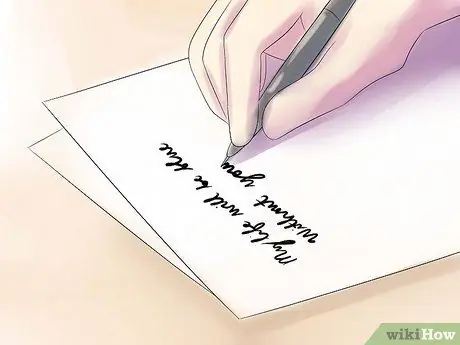
Step 1. Write lyrics with emotional meaning
While popular music may sound simple at times, there's no right way to write song lyrics. Many good song lyrics are taken from a personal point of view that comes from human experience itself. Some songs are happy, some are sad. Some are relaxed, while others are paranoid. Some carry the personal experience of the author, others not at all. After all, a good song conveys strong emotions. For beginners, when writing a song, try to express how you feel when you think of a topic, event, or person that is important to you. Your lyrics don't need to directly mention this, although this is also possible.
-
Let's examine the opening lyrics of two songs, firstly Eliiot Smith's "Between the Bars" and Kendrick Lamar's "Swimming Pools (Drank). Both songs are about alcohol addiction. However, note that while the two songs take different approaches to the same topic, Smith opts not to be direct, Lamar is more direct. Both still produce emotional lyrics.
- Between the Bars: Drink up, baby, stay up all night/With the things you could do, you won't but you might/The potential you'll be that you'll never see/The promises you'll only make
- Swimming Pools (Drank): Now I done grew up round some people living their life in bottles/Granddaddy had the golden flask back stroke every day in Chicago/Some people like the way it feels/Some people wanna kill their sorrows/Some people wanna fit in with the popular /That was my problem
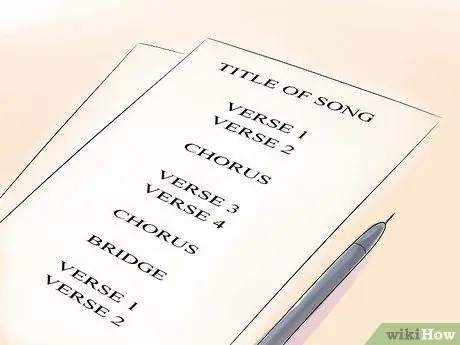
Step 2. Give your song a structural direction
So, you've thought about the things that make you feel strong emotions and wrote them down into lyrics. This is a great start. Next, you need to organize these lyrics into the structure of the song - decide which will be the verse, which will be the chorus, which will be the bridge. Many popular songs have lyrics that rhyme, if you want rhymes in your lyrics, you need to define the rhyme scheme.

Step 3. Change the instrumental background sound for your song
Once you've written a song and organized it into a song, it's time to start thinking about how it's going to sound. Again, there's no right way to write a song, but you'll find that it's easier to arrange the instrumental parts first before setting the vocal melody, this way, you'll be able to fit your vocals into a solid soundtrack, rather than creating a soundtrack that matches your vocals.. Naturally, try to compose instrumental accompaniment that supports the emotion conveyed by the lyrics.
The ratio of the instrumental parts of music varies greatly in terms of volume and number. Some songs will be very overwhelmed with music, whereas others can be very quiet. For example, compare "Only Shallow" My Bloody Valentine to "Polly" Nirvana. “Only Shallow” is accompanied by loud music such as guitar distortion, while “Polly” is darker with only acoustic guitar, Kurt Cobain's voice, short bass interlude, and a few drum beats

Step 4. Set your lyrics to a melody
In much popular music, the singer's vocals are the main feature of the song, backed up by background music. Now that you have the lyrics, and the background music, it's time to turn your words into music. Give your lyrics a different melody between verse and chorus. Although some musicians use the concept of discord (a conflict between keys in a piece of music), in general, you want the melody of your vocals to match the chords of the song you're playing.
- It is not impossible to successfully write and sell acapella songs (only vocals without instruments) or only instruments. For example, Shai's version of "If I Ever Fall In Love" is an acapella music that had become number two on the best US music charts. Likewise, recently music with slightly more lyrics like dance music is also in vogue. However, most popular music has both lyrics and instrumentals, so writing like this will increase your chances of selling songs you love.
- If you're writing rap songs, you don't have to worry about pitch because rap music is sung without notes. However, some rappers also add notes to the chorus or small parts of their songs. Look at Chance the Rapper's "Juice" as an example of this technique.
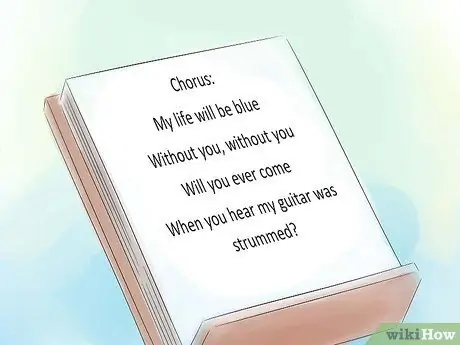
Step 5. Pay attention to the chorus or hook of your song
Many popular songs with mediocre verse, poor instrumentation, or poor lyrics are saved by very good choruses (sometimes called “hooks”). Try to make the chorus of your song very good. Usually, the chorus is the part that listeners will remember the most. Another way to do this is to treat the existing hook like a thesis statement. If you had to sum up all the emotions in your song in a few lines, how would you do it?

Step 6. Be passionate
More than anything else, when writing songs, try to inspire your work with a passion for music and lyrics. Your song should make you, as the performer, feel strong emotions - if you feel bored with your own song, don't be afraid to start over. Music is something that is practiced and perfected with a lot of practice. The best way to motivate you is to be passionate about it.
Part 2 of 2: Navigating the Music Industry

Step 1. Play on stage
While many musicians (such as the Beatles) were able to leave performing on stage to devote themselves to the studio, few became famous without having performed on stage. To start building an audience and be recognized as a musician, perform in your local area. A bar, club or cafe is a classic place to start. Any place or event where people gather can be an opportunity to perform. Weddings, birthdays, or any other event can be a place to build an audience and sell your music.
Don't be afraid to start small - all musicians start small. An example is Lady Gaga who performed in several NYC bars and nightclubs for several years in the mid 2000s before becoming as popular as she is today

Step 2. Record your music
Almost any serious piece of music has to spend some time in the studio. Generally, in a studio, the artist will partner with a producer or technician who makes the final product to their satisfaction. They your music gives you the opportunity to distribute it to fans. This is also an opportunity that can help you earn money. These recordings can also be demos for major music labels. The demo is a mini album (3-6 songs) that gives you the opportunity to show your musical style, think of this demo as your music CV for a record label.
- Practice your song in detail before entering the studio. Studios can be expensive, so you'll want to shoot them fast. The costs associated with the length of a studio session can add up quickly, so make sure you're properly trained with your song.
- For the same reason, you should have all the details of your song ready like arrangements, so you don't have to experiment in the studio. For example, don't let the producer convince you to waste time trying out effects pedals. The place to experiment and improvise is in the practice room.
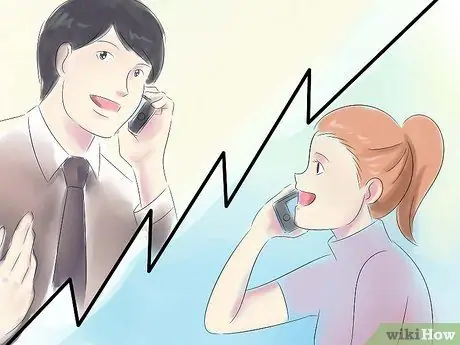
Step 3. Consider seeking the help of a manager
Renting your own studio and stage time, negotiating your own contracts, and distributing your music time can be time consuming and require expertise. Because of this, many musicians decide to hire professional managers or agents who help manage the business aspects of the music industry. While this option may not be suitable for those on a budget, it can help promising talented artists maximize their talents. Make sure your manager is well known and has a reputation.
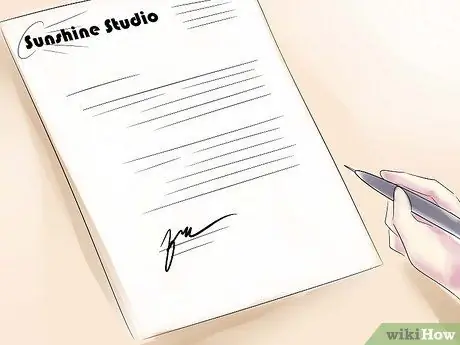
Step 4. Reach out to a record company
When you start putting together your demos, you might want to try selling yourself to a record company and get a contract. Even though they are big, international label companies are sometimes willing to release unknown artists (see: Epic Records signed the Hip Hop group Death Grips). But the possibility is more in independent labels which are still small. Look for a record label that publishes music like the music you are going to sell. Then, if they are open, send them demos, photos, interviews, reviews, biographies.
Of course, perhaps the best way to get noticed by a music label is to draw attention to yourself through musical innovation, great stage acts, and a unique self-image. In other words, if you can be famous without a record label, the record label will come to you

Step 5. See unusual opportunities to sell yourself as a musician
Showing your song on stage is important, but it's only one way to be professional, not the only one. Music artists can (and should) try to find work as session musicians, composers, or any other opportunity to contribute to other people's music projects to grow your name.
- One that is often tried is writing jingle music. Record companies often hire musicians to compose and perform songs in commercials. In fact, many music production houses specialize in this process, using in-house musicians to create jingles for their clients.
- Especially when starting out, musicians can't be too picky with their clients. Don't worry about “selling out” - this is part of making your name known as a musician. In fact, many famous performers initially took part in “commercially friendly” musical work. For example: Tupac Shakur was originally a member of the Digital Underground Hip Hop group.

Step 6. Build different depictions
Music is more competitive now. With the development of online music, contemporary musicians have to compete not only with each other, but also with the stars of the past whose music is still being sold today. In order to have the best opportunity to sell yourself as a musician, it is very important to make yourself stand out from the rest. Do not create works that make you confused with other artists. Just create a unique and artistic work.
This advice also applies to how you appear. Many successful musicians like Prince, Michael Jackson, Freddie Mercury, and many others, had unforgettable stage acts. The clothes they wear, the way they go on stage, the way they play songs, all these things combine to create a portrayal of you as a performer, so take time to develop this aspect as an artist
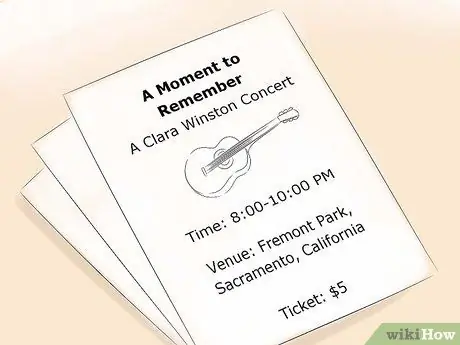
Step 7. Promote yourself
Whether you're playing at a live event or selling your latest album, it's always important to reach more people. Advertise yourself as a musician in your own way, such as Word Of Mouth (for example, if you are a part-time music teacher, tell your students about your concert after class), self-advertising (such as brochures) and cross-promotion with local radio are great idea to promote yourself. Now, social media can also be used to reach your fans instead of conventional marketing.
Pamphlets are a great method for musicians to promote themselves. It can be mass produced cheaply because it is just a basic printing process. Make sure your flyer includes all the information viewers need to know such as the place, time, date and admission ticket. Also make sure that your flyer is located in a place of concern such as a live music venue, bar, coffee shop, or campus
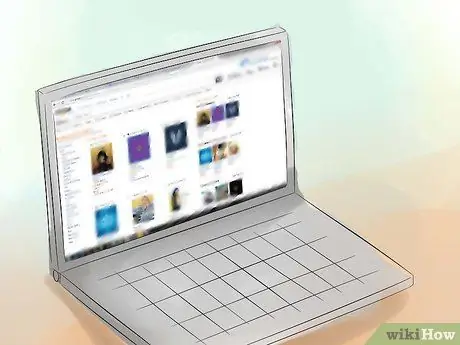
Step 8. Market your music live and online
No matter how good they are, your song won't sell itself. Use every opportunity and performance to sell your song, either by reminding your audience that you have a CD sold or by directing them to your personal website. Feel free to sell music. If you put on good music, you deserve to make money from music.
-
The Internet offers many exciting opportunities for musicians to share and sell their music. Social media like Facebook and Twitter allow musicians to connect with fans and let them know about new songs or stage schedules. Also sites like Artistir, GarageBand, and Soundcloud offer the opportunity for artists to even sell their music online.
Some artists these days even managed to succeed just because of the internet. For example, Justin Bieber became successful starting with a record label that accidentally saw Bieber's video on an online site
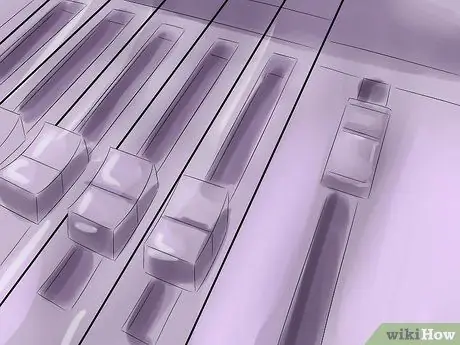
Step 9. Pay attention to the production value of your music
You may notice that the music on the market is almost flawless. The value of production is important for this. Minor errors such as sound falsification, background noise, or inappropriate music may be noticed by listeners. So make sure that your music production fits in with your professional goals.
Some musicians know how to produce their own songs. Kanye West and some of his friends in the Hip Hop world, for example, produce their own songs. However, many musicians don't know how to produce their own music. If you're like this, consider spending some studio time with a professional producer who can help you record and organize your music as professionally as possible

Step 10. Don't let the music industry take advantage of you
Unfortunately, the music industry has a history of taking advantage of the kindness of musicians. Always be on the lookout for anyone be it a tour manager, record label, venue owner, concert promoter, or anyone else who may be involved in your career. Don't let someone you don't know get you into an ambiguous contract. Do not agree to work for free or possibly to be paid later. Don't let managers or staff who work for you make decisions without your knowledge. Stay alert. While there are still many honest and ethical people, it only takes a bad legally binding contract to destroy the career you have built.
The contract is a "must". Oral agreements, even with people you know closely, are not recommended. Always make the agreement in writing. If you are asked to sign a binding contract (a recording contract for example), consult an experienced attorney before signing
Tips
- Sing from your heart and don't be afraid to be yourself.
- Dare to be different! Maybe you are not always considered popular, but people are always looking for something different. If you have deep lyrics or a song with a simple key, that's different! Carry on with your style, or you won't enjoy it in the long run even if you are rich!
- Write for personal satisfaction, not for others. If you end up getting rich because of it, this is a bonus.
- Have fun making songs and hope your sales make some money.
- Find a local band you know to play your song with.






